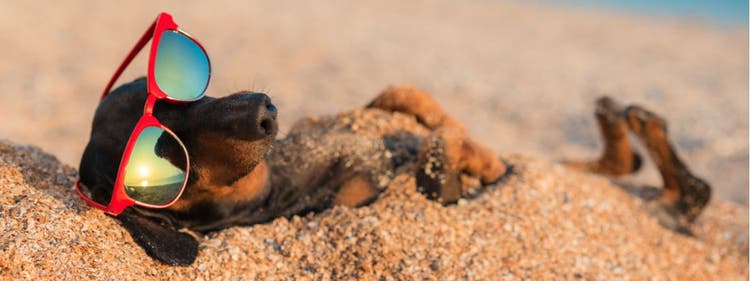
Sunburns and Solar Protection for Dogs
Summertime is right around the corner! That means barbecues in the park, pool parties, days at the beach, and long hikes, often with your furry companion in tow. We all know the importance of sunscreen for our own skin, but did you know that dogs are prone to the same risks of sun damage as humans?
Here are some tips to help you and your dog make the most out of those sunny summer days:
What Causes Sunburns?
Ultraviolet rays have two wavelengths that can cause skin damage, known as UVA and UVB rays.
UVA rays penetrate deeper into the skin and cause damage to the cells in the dermis (aka collagen). Damage from UVA rays is not immediately seen, but can lead to skin damage over time. UVB rays do not penetrate as deep and are responsible for superficial damage, like visible sunburns.
The effects of UV rays are more significant at higher elevations. While a dog’s hair coat is naturally protective against UV damage, they are still susceptible to sunburns and solar damage to their skin.
Why Are Dogs More at Risk of Solar Damage Than Humans?
Just like in humans, sunburns in dogs will result in temporary reddening of the skin. However, with their hair coat, it can be more challenging to see these changes occur and a proactive approach to preventing sun damage is recommended.
Breeds with short coats, like Boxers and pit bulls, are more prone to solar damage than dogs with thick, fluffy coats. Light-colored hair coats, such as white and fawn, are less protective against the sun compared to darker hair. Lastly, hairless or thinly-haired areas, including the belly, nose, bridge of nose, groin, and underarm area are more susceptible to UV damage.
How Can I Protect My Dog?
Here are steps to decrease the risk of sun damage for your pets:
- Avoid long walks or prolonged outdoor time during peak UV hours (9am-4pm).
- Use sunscreen! Yes, dogs benefit from the UV protection of sunscreen just like humans. It is best applied to thinly haired or hairless areas before extended time outside. While there are pet-specific sunscreens, some human products are safe for use on animals. It is important that sunscreens do not contain zinc, since ingested zinc can cause gastrointestinal upset and vomiting. Products with UVA and UVB coverage are ideal.
- Dogs that do not tolerate sunscreen application, are outside for an extended time, or have pre-existing solar damage may benefit from UV protectant body suits. There are several companies that make custom full body suits that are lightweight and provide UV protection. Not to mention, they are an adorable accessory. Finally, fashion meets function!
- Monitor the amount of time your pet spends sunbathing, inside and outside. Remember, UVA light can penetrate glass, so even pets that sunbathe inside are prone to solar damage to their skin.
Enjoy those dog days of summer worry-free by remembering to pack extra sunscreen for your pets!